Benefits of Ginger
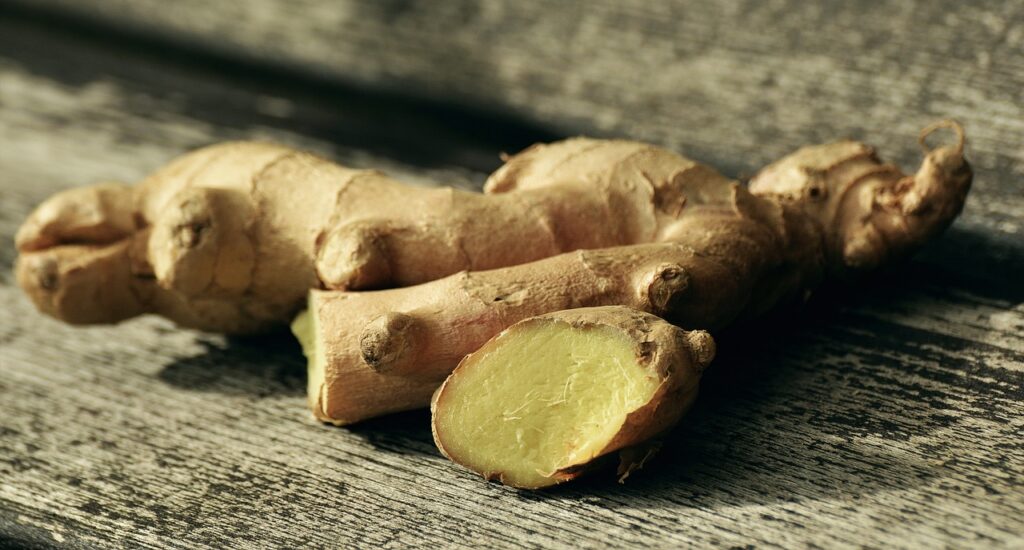
- Table of Contents
1: Introduction
2: The Roots of Ginger - Culinary Delight:
- Medicinal Marvel:
- Digestive Aid:
- Anti-Inflammatory and Antioxidant Powerhouse:
- Cultural and Traditional Significance:
- Modern Applications:
3: The Health Benefits of Ginger
Digestive Aid:
Anti-Inflammatory Properties:
Immune System Boost:
Pain Relief:
Heart Health
Weight Management:
Anti-Nausea:
4: Culinary Uses of Ginger
Flavor Enhancer:
Tea and Infusions:
Condiments and Sauces:
5: How to Incorporate Ginger into Your Diet
Fresh Ginger:
Ground Ginger:
Ginger Supplements:
6: Precautions and Side Effects
Moderation:
Allergic Reactions:
7: Conclusion
8: FAQs (Frequently Asked Questions)
-
1: Introduction
Ginger, scientifically known as Zingiber officinale, is more than just a culinary delight. This humble root has been used for centuries for its incredible medicinal properties and distinctive flavor. In this article, we will delve into the world of ginger and explore its numerous health benefits, culinary uses, and much more.
- Ginger, the aromatic rhizome of the Zingiber officinale plant, has been treasured for centuries not only for its distinctive flavor but also for its remarkable health benefits. This versatile spice has earned a prominent place in traditional medicine systems worldwide, owing to its potent medicinal properties. From aiding digestion and alleviating nausea to reducing inflammation and providing antioxidant support, ginger offers a wide array of advantages for our well-being. In this exploration of the benefits of ginger, we will delve into the rich tapestry of its uses and delve into how this humble root can play a pivotal role in promoting a healthier and more vibrant life.
-
2: The Roots of Ginger
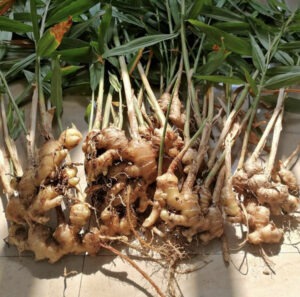 Ginger (Zingiber officinale) is a fascinating plant renowned not only for its culinary uses but also for its rich historical, cultural, and medicinal significance. Its roots, or more accurately, rhizomes, are the primary part of the plant that is harvested and used in various forms, including fresh ginger, dried ginger, ginger powder, and ginger oil. The roots of ginger have a long and storied history, dating back thousands of years to ancient China and India, where it was first cultivated.
Ginger (Zingiber officinale) is a fascinating plant renowned not only for its culinary uses but also for its rich historical, cultural, and medicinal significance. Its roots, or more accurately, rhizomes, are the primary part of the plant that is harvested and used in various forms, including fresh ginger, dried ginger, ginger powder, and ginger oil. The roots of ginger have a long and storied history, dating back thousands of years to ancient China and India, where it was first cultivated.-
Culinary Delight:
- Ginger’s roots are a staple ingredient in cuisines around the world. Known for its distinctive, slightly spicy, and aromatic flavor, fresh ginger adds depth and zest to a wide variety of dishes. It’s used in stir-fries, soups, curries, and even baked goods like gingerbread and cookies. Dried ginger and ginger powder are also common spice cabinet staples, contributing warmth and flavor to both sweet and savory recipes.
Medicinal Marvel:
- Ginger’s roots have been used for centuries in traditional medicine systems, such as Ayurveda and Traditional Chinese Medicine, for their potent health benefits. Ginger is renowned for its anti-nausea properties, making it a popular remedy for motion sickness, morning sickness during pregnancy, and nausea induced by chemotherapy. It is also recognized for its anti-inflammatory effects, which can help alleviate various conditions like arthritis and muscle pain.
Digestive Aid:
One of the most well-known benefits of ginger is its ability to aid digestion. Ginger stimulates the production of digestive enzymes, helping to break down food and ease discomfort associated with indigestion. Ginger tea, made from steeping fresh ginger root in hot water, is a soothing remedy for digestive troubles.
Anti-Inflammatory and Antioxidant Powerhouse:
Ginger contains bioactive compounds, such as gingerol, which have strong anti-inflammatory and antioxidant properties. These compounds help combat oxidative stress and inflammation in the body, potentially reducing the risk of chronic diseases.
Cultural and Traditional Significance:
Ginger has played a pivotal role in various cultures and traditions. In addition to its medicinal and culinary uses, it is often used in rituals, as an offering, or as a symbol of hospitality. For example, in many Asian cultures, ginger is served with sushi as a palate cleanser and to enhance the dining experience.
Modern Applications:
Today, ginger is not only a kitchen staple but also a subject of ongoing scientific research. Studies continue to uncover new potential health benefits of ginger, from its role in managing diabetes to its impact on cardiovascular health and immune system support.
In conclusion, the roots of ginger have a multifaceted history and a wide range of uses that extend far beyond its culinary charm. This humble rhizome has earned its place as both a culinary delight and a powerful medicinal ally, offering a wealth of benefits to those who embrace its unique flavor and healing properties. Whether enjoyed in a steaming cup of ginger tea, a spicy stir-fry, or as a natural remedy for various ailments, ginger’s roots remain deeply rooted in our global culture and continue to captivate the world with their myriad applications.
3: The Health Benefits of Ginger
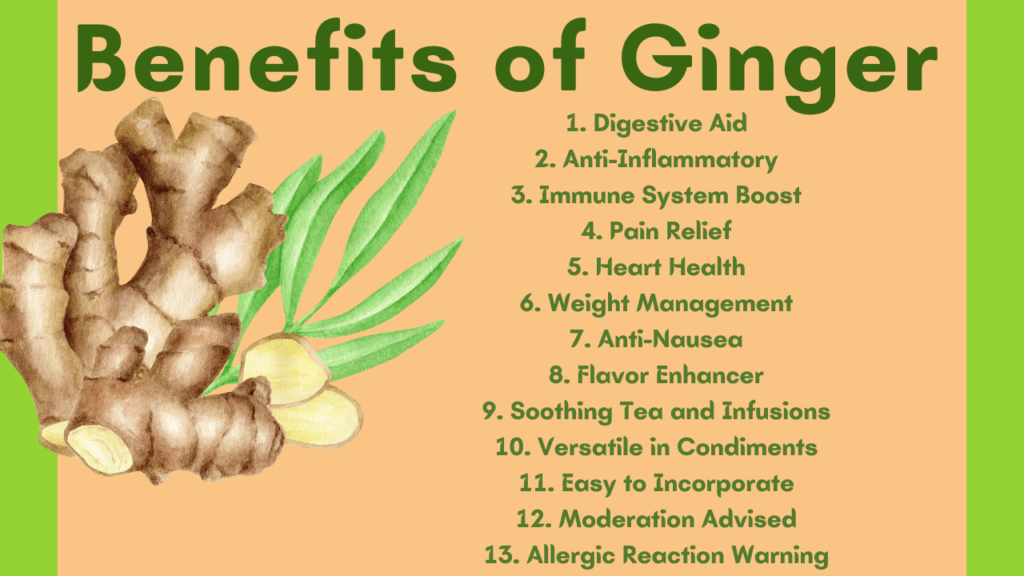
Ginger (Zingiber officinale) is a remarkable spice with a rich history of medicinal use, offering a multitude of health benefits that make it a valuable addition to one’s diet and wellness regimen. Here, we explore some of the key health benefits of ginger, ranging from its role as a digestive aid to its potential in promoting heart health, weight management, and more.
Digestive Aid:
Ginger has long been recognized for its ability to alleviate digestive discomfort. It stimulates the production of digestive enzymes, helping the body break down food more efficiently. Consuming ginger can ease symptoms of indigestion, bloating, and flatulence, making it a natural remedy for gastrointestinal issues.
Anti-Inflammatory Properties:
Ginger contains bioactive compounds, primarily gingerol, that exhibit powerful anti-inflammatory effects. These compounds can help reduce inflammation in the body, potentially providing relief to individuals with conditions like osteoarthritis and rheumatoid arthritis. Regular consumption of ginger may contribute to a reduction in chronic inflammation, which is linked to various diseases.
Immune System Boost:

Ginger is rich in antioxidants, which play a vital role in supporting the immune system. These antioxidants help the body combat oxidative stress and free radicals, reducing the risk of infections and chronic diseases. Incorporating ginger into your diet can contribute to a stronger immune response.
Pain Relief:
Ginger’s anti-inflammatory properties extend to pain relief. It has been used as a natural remedy for muscle and joint pain, menstrual cramps, and headaches. Some studies suggest that ginger may be as effective as non-steroidal anti-inflammatory drugs (NSAIDs) in managing pain, with fewer side effects.
Heart Health:
Research indicates that ginger may have a positive impact on heart health. It can help lower blood pressure and reduce cholesterol levels, potentially lowering the risk of heart disease. Additionally, its anti-inflammatory and antioxidant properties contribute to overall cardiovascular well-being.
Weight Management:
Ginger may aid in weight management efforts. It can increase feelings of fullness and reduce hunger, which may help prevent overeating. Some studies suggest that ginger may enhance calorie burning and fat loss, making it a potential complement to a balanced diet and regular exercise.
Anti-Nausea:
Ginger is renowned for its anti-nausea properties, making it a trusted remedy for various types of nausea and vomiting. It is particularly effective in alleviating motion sickness, morning sickness during pregnancy, and nausea induced by chemotherapy. Ginger can be consumed as ginger tea, ginger candy, or simply as fresh ginger slices.
In conclusion, ginger is a versatile and potent spice with a wide range of health benefits. Whether used as a digestive aid, an anti-inflammatory agent, an immune system booster, or a natural pain reliever, ginger has earned its place in both traditional and modern medicine. Its role in promoting heart health, aiding in weight management, and reducing nausea further underscores its value as a natural remedy and a flavorful addition to a healthy diet. Incorporating ginger into your daily routine may help you harness these numerous health benefits and enhance your overall well-being.
4: Culinary Uses of Ginger
Ginger, with its distinctive flavor and aromatic profile, is a versatile spice that adds depth and complexity to a wide range of culinary creations. Its culinary uses extend far beyond its role as a spice, making it a cherished ingredient in cuisines worldwide. Here, we explore the culinary versatility of ginger, including its role as a flavor enhancer, its use in tea and infusions, and its contribution to condiments and sauces.
Flavor Enhancer:
Ginger is celebrated for its ability to elevate the flavor of dishes. Its spicy and slightly sweet taste can be used to balance and enhance the taste of both sweet and savory dishes. In Asian cuisine, it often serves as a key ingredient in spice blends like curry powders, contributing warmth and depth to dishes. Whether grated, minced, or sliced, ginger is a culinary workhorse that can transform a simple meal into a gourmet delight.
Tea and Infusions:
Ginger is a beloved ingredient in the world of tea and infusions. Ginger tea, made by steeping fresh ginger slices or ginger powder in hot water, is a soothing beverage enjoyed for its warming properties and potential health benefits. It is often sweetened with honey or lemon for added flavor. Ginger can also be used to infuse a variety of liquids, from cocktails to syrups, imparting its unique aroma and taste.
Condiments and Sauces:
Ginger plays a pivotal role in the creation of condiments and sauces, adding complexity and depth to various dishes. Here are a few notable examples:
Ginger Garlic Paste:
A common ingredient in Indian cuisine, ginger garlic paste combines the flavors of fresh ginger and garlic, lending a bold and aromatic base to many curries and marinades.
Ginger Syrup:
Ginger syrup is a versatile sweet syrup infused with ginger flavor, used in both alcoholic and non-alcoholic beverages. It’s a key ingredient in cocktails like the Moscow Mule and is also used to sweeten teas and desserts.
Ginger Dressings:
Ginger-based salad dressings are popular for their vibrant taste. They typically combine ginger with soy sauce, sesame oil, and other ingredients to create a zesty and aromatic dressing for salads and grilled meats.
Ginger’s culinary applications are as diverse as they are delicious, making it a beloved spice in kitchens worldwide. Its ability to enhance flavors, whether through subtle notes or bold infusions, makes it a staple in both home cooking and gourmet cuisine. From its role in spice blends to its use in soothing teas and its contribution to condiments and sauces, ginger remains an essential ingredient that continues to captivate the palates of food enthusiasts everywhere.
5: How to Incorporate Ginger into Your Diet
Ginger, with its unique flavor and health benefits, is a versatile ingredient that can be easily integrated into your daily diet. Whether you prefer the sharpness of fresh ginger, the convenience of ground ginger, or the simplicity of ginger supplements, there are numerous ways to enjoy this flavorful spice. Here’s a comprehensive guide on how to incorporate ginger into your diet, including fresh ginger, ground ginger, and ginger supplements:
Fresh Ginger:
a. Ginger Tea:
One of the simplest ways to enjoy fresh ginger is by making ginger tea. Peel and slice a small piece of fresh ginger, then steep it in hot water. Add honey and lemon for extra flavor.
b. Smoothies:
Fresh ginger adds a zesty kick to your morning smoothie. Blend a small piece of peeled ginger with fruits, yogurt, and your choice of liquid for a refreshing beverage.
c. Stir-Fries:
Fresh ginger is a staple in Asian cuisine. Grate or finely chop it and add it to stir-fried dishes for a burst of flavor.
d. Salad Dressings:
Create a ginger-infused salad dressing by blending fresh ginger with ingredients like soy sauce, vinegar, sesame oil, and honey.
e. Marinades:
Incorporate fresh ginger into marinades for meats or tofu. It not only adds flavor but also helps tenderize proteins.
f. Pickled Ginger:
Pickling fresh ginger in vinegar and sugar creates the familiar pink, tangy slices often served with sushi. It makes a delightful condiment or palate cleanser.
Ground Ginger:
a. Baking:
Ground ginger is a key ingredient in gingerbread, cookies, cakes, and other baked goods. It adds warmth and a hint of spice to sweet treats.
b. Spice Blends:
Ground ginger is a component of many spice blends, such as curry powder and pumpkin spice. Experiment with these blends in your savory and sweet dishes.
c. Oatmeal and Cereals:
Sprinkle ground ginger onto your morning oatmeal or cereal for added flavor and a nutritional boost.
d. Soups and Stews:
Enhance the flavor of soups, stews, and curries by adding a pinch of ground ginger. It complements both vegetarian and meat-based dishes.
Ginger Supplements:
a. Capsules:

Ginger supplements are available in the form of capsules or pills. These are convenient for those who may not enjoy the taste of ginger but still want to benefit from its health properties. Follow the recommended dosage on the product label.
b. Ginger Extract:
Ginger extract is a concentrated form of ginger available in liquid or powder form. It can be added to beverages, smoothies, or used as a natural flavoring.
c. Ginger Chews:
Some people prefer ginger chews or candies for a quick and portable ginger fix. These can be enjoyed as a snack or to alleviate nausea.
d. Ginger Powder:
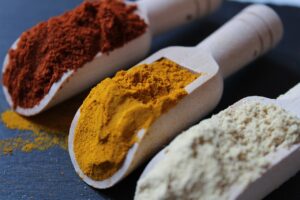
Ground ginger in powder form can also be encapsulated and taken as a supplement for its potential health benefits.
Remember that ginger can have a strong and spicy flavor, so start with smaller amounts and adjust to your taste preferences. It’s always a good idea to consult with a healthcare professional, especially when using ginger supplements, to ensure they are suitable for your specific health needs. By incorporating ginger into your diet in various forms, you can not only enhance the taste of your meals but also harness its potential health benefits.
6: Precautions and Side Effects of Ginger
While ginger offers numerous health benefits and culinary delights, it’s important to exercise caution and be aware of potential side effects. Here, we explore key precautions to take when consuming ginger, emphasizing the importance of moderation and awareness of potential allergic reactions.
1: Moderation:
Gastrointestinal Distress:
- Ginger, particularly when consumed in excessive amounts, can sometimes lead to gastrointestinal discomfort. This may include symptoms such as heartburn, stomach upset, or diarrhea. To avoid such issues, start with small amounts of ginger and gradually increase your intake as your body becomes accustomed to it.
Blood Thinning:
- Ginger has natural blood-thinning properties, which can be advantageous for some individuals. However, if you are already taking blood-thinning medications, such as warfarin, it’s crucial to consult with your healthcare provider before significantly increasing your ginger consumption. Excessive ginger intake, especially in supplement form, can potentially interfere with blood clotting, leading to bleeding issues.
Pregnancy:
- Pregnant women should consume ginger in moderation. While it can help alleviate nausea and morning sickness, excessive ginger intake during pregnancy may not be advisable. It’s best to consult with a healthcare professional for guidance on safe ginger consumption during pregnancy.
2: Allergic Reactions:
Allergies to Ginger:
- Some individuals may have allergies to ginger, which can manifest as skin rashes, itching, swelling, or difficulty breathing. If you suspect you are allergic to ginger or experience any allergic symptoms after consuming it, seek medical attention immediately. It’s essential to be cautious, especially if you’ve never consumed ginger before.
Cross-Allergies:
- People with allergies to certain foods, such as bananas, kiwi, or avocados, may also be at risk of cross-allergies to ginger. These individuals should be particularly vigilant and consult with an allergist if unsure about ginger consumption.
3: Interaction with Medications:
Drug Interactions:
- Ginger can interact with various medications, including anticoagulants, blood pressure medications, and diabetes drugs. If you are taking any prescription medications, discuss your ginger consumption with your healthcare provider to ensure there are no adverse interactions that could affect your health.
-
4: Bleeding Disorders:
-
Hemophilia and Platelet Disorders:
- Individuals with bleeding disorders like hemophilia or platelet disorders should exercise caution when consuming ginger. Its blood-thinning properties can potentially worsen bleeding issues. Consult with a healthcare professional for personalized advice.
5: Surgery:
Pre-Surgery Caution:
If you are scheduled for surgery, it’s advisable to discontinue ginger consumption a few weeks before the procedure. Ginger’s blood-thinning effects could lead to excessive bleeding during surgery.
6: Reproductive Health:
Menstrual Cycle:
Ginger may influence the menstrual cycle. Some women have reported that it can stimulate uterine contractions, potentially affecting the timing and intensity of menstrual periods. If you have concerns about this, consult with a healthcare provider.
In conclusion, while ginger is generally safe for most people and offers a wide range of health benefits, it’s essential to be mindful of potential precautions and side effects. Moderation is key, especially if you are new to ginger consumption or have underlying health conditions. If you experience adverse reactions or are unsure about ginger’s compatibility with your health status or medications, consult with a healthcare professional for personalized guidance and recommendations. Always prioritize your well-being and safety when incorporating ginger into your diet or wellness routine.In conclusion, ginger is truly a super spice with a myriad of health benefits and culinary uses. From aiding digestion to boosting the immune system and adding a zing to your dishes, ginger has rightfully earned its place in kitchens and medicine cabinets worldwide.
For more details visit hopkinsmedicine.org
7: Conclusion
In conclusion, ginger is truly a super spice with a myriad of health benefits and culinary uses. From aiding digestion to boosting the immune system and adding a zing to your dishes, ginger has rightfully earned its place in kitchens and medicine cabinets worldwide.
8: FAQs (Frequently Asked Questions)
- Can ginger be used as a remedy for motion sickness?Yes, ginger is known for its anti-nausea properties and can help alleviate symptoms of motion sickness.
- Is it safe to consume ginger during pregnancy?In moderate amounts, ginger is generally considered safe during pregnancy and can help with morning sickness.
- Are there any interactions between ginger and medications?Ginger can interact with certain medications, so it’s advisable to consult with a healthcare professional if you have concerns.
- Can ginger be used to treat migraines?Some studies suggest that ginger may help reduce the frequency and intensity of migraines, but further research is needed.
- What’s the recommended daily intake of ginger for its health benefits?The recommended daily intake of ginger varies, but 1-2 grams of ginger per day is a common guideline for its health benefits.
-
Nutrition Facts of Ginger
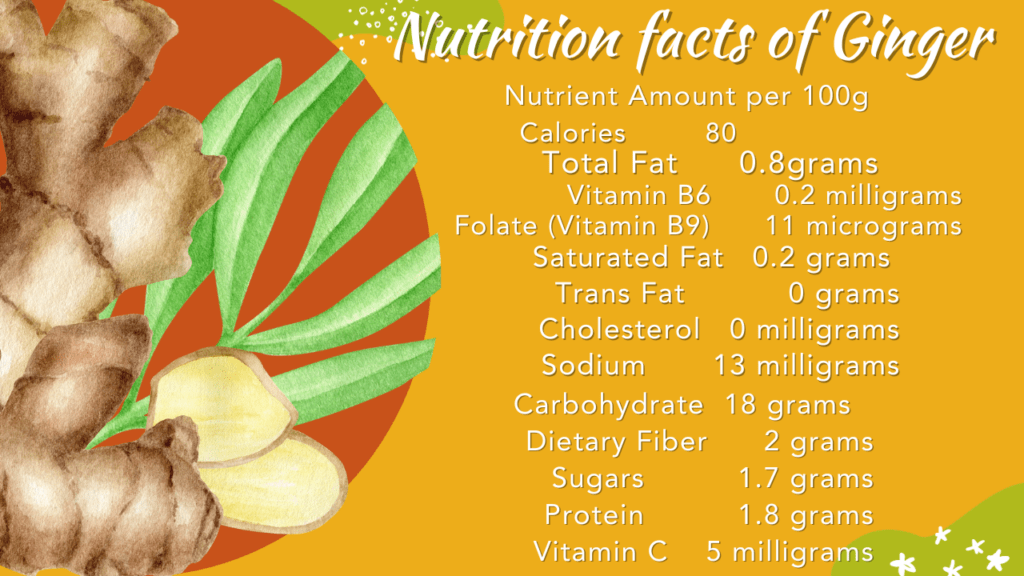


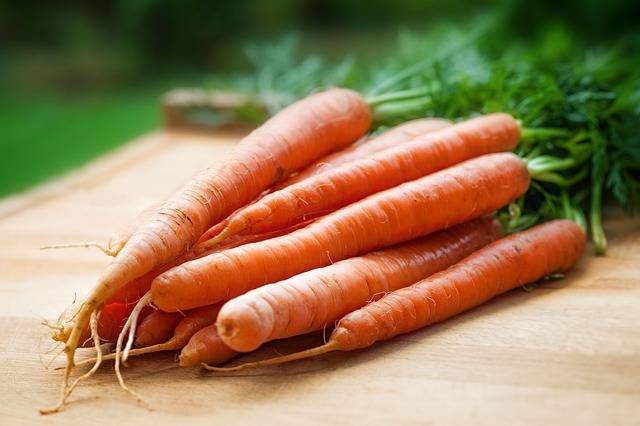
Just a wee comment … best to avoid ginger when you are always feeling hot or struggle with menopausal sweats as ginger, according to TCM, is really hot!
Thanks for the tip! Avoiding ginger is a good idea if you’re prone to feeling hot or dealing with menopausal sweats, as per traditional Chinese medicine (TCM). It’s essential to consider how different foods can affect our bodies during specific life stages. If you have more insights to share, please do!